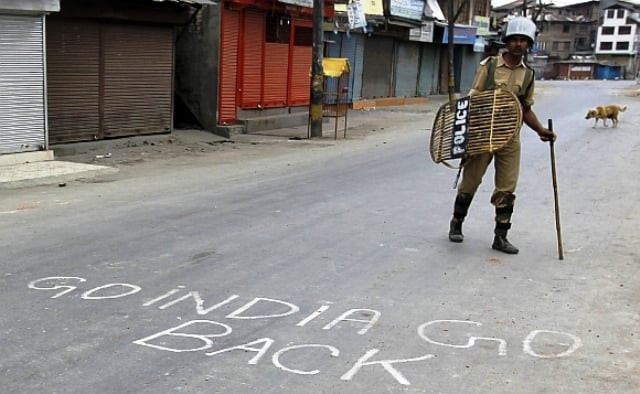Decades of misuse of power by the armed forces has eroded the civil-military relationship to the point that it is impossible to expect that any solution to Kashmir can include the current levels of military deployment.
Recently, the media has been quick to point out the lessening of violence or the tourist influx as indicators of normalcy in India-administered Kashmir. However, alight from the Srinagar airport and you are met with miles of barbed wire, green barracks, and scores of emotionless soldiers with rifles and machine guns whose heads turn as they maintain eye contact with passersbys, as if waiting for a signal or an eye twitch of betrayal.
Large yellow signs promising safety as the only consequence of the military occupation help bottleneck traffic, forcing it to a frustrating crawl. The snarling men in uniforms at checkpoints who bark questions and inspect car trunks further compound the quiet tension that hangs in the daily fog. This may not be the average tourist destination for the new traveller, but for Kashmiris, this is normalcy.
This ‘normalcy’ has had irreparable effects in Kashmir, specifically a deteriorating civil-military relationship as a direct result of irresponsible counterinsurgency tactics. It should be admitted that the army has attempted to perfect its counterinsurgency strategy, taking care to avoid some of the mistakes it made in the Punjab state during the Sikh militancy period of the 1980s.
In Kashmir, the military flooded the state with an overwhelming number of security forces, avoided high profile confrontations, and redeployed captured militants-turned-renegades to fight against militants at large.
The state also held elections in 1996, the first in ten years. However, reports soon emerged of soldiers going door to door, intimidating and forcing Kashmiris to local polling stations at gunpoint. Two men were killed in this hoopla.
Death is no stranger in the Kashmir Valley.
The serious human rights abuses perpetrated by the security forces over the course of the past two decades of conflict are not inconsequential. Since 1986, thousands of Kashmiris are believed to be have been indiscriminately tortured, forcibly disappeared, or illegally killed by Indian security forces in the counterinsurgency crackdown.
Just last year, the Jammu and Kashmir State Human Rights Commission (SHRC) announced thediscovery of 2,730 unidentified bodies dumped in hidden mass graves across the state. Many of the bodies had bullet injuries and charred limbs. The government quickly declared the bodies to be of Pakistani militants. However, SHRC identified at least 574 bodies to be of local Kashmiris, possibly victims of enforced disappearances.

Even these statistics seem wanting when compared to the claims of the Association of Parents of Displaced Persons (APDP). An organisation led by families of victims of enforced disappearances, APDP maintains that over 8,000 Kashmiris have vanished since the early 1990s.
Following the Commission’s announcement, Jammu and Kashmir Chief Minister Omar Abdullah promised investigation of the graves and boldly declared that no guilty party shall go free. The likelihood of this is dismal, given the army’s human rights track record. Such an investigation would require the cooperation of the army and paramilitary forces, which historically enjoy unrestricted impunity granted to them by several laws, including the notorious Armed Forces Special Powers Act (AFSPA).
Under AFSPA's precedent, security officials can accuse criminal or militant involvement and then harass, search, arrest, kidnap, rape, torture, or murder a resident of an occupied state and escape with complete impunity. These laws have allowed security forces to escape investigations and prosecutions for horrific crimes in Punjab, Assam, and other Indian states. More than a year has passed since the release of the Commission’s report without any further progress or identification of bodies. Yet another report meticulously documenting human rights abuses in 50 Kashmiri villages emerged last month, but little is expected to be done for the victims.

In 2009, Abdullah made the first of several blustering calls for the removal of AFSPA from Kashmir. The army coolly pushed back with demands of more special powers with no indication of compromise. Recently, Abdullah reiterated de novo for a dismantling of the AFSPA, a move that even the taciturn national government has acknowledged, as well as reduction of armed forces numbers in the state. As expected, the army, a historically balky institution, refuses to budge.
Militancy in Kashmir has finally been contained after 23 years of tyranny and militarisation, but the civil-military fabric has broken down beyond repair. With the protester evolving from militants trained across the border to outraged native Kashmiri youth, the deep-seated disaffection amongst the people demands a different kind of solution, one that does not involve occupation.

The Kashmir state must be granted political and economic freedom, including the right to free elections, free trade and commerce opportunities, and a free market economy for local livelihoods and industries.
Economic discontent, a contributing cause of the outbreak of violence in 1986, continues to fester and exacerbate the alienation of Kashmiri people. Artisans, once renowned for their walnut woodcraft and hand woven silk rugs, have been driven out of business after decades of economic limitations. Removal of existing interstate and international trade restrictions would not only support these dying arts, but also facilitate the native fruit, nut, horticulture, and lumber industries, many of which are currently monopolised by nefarious military contracts.
Kashmir also has tremendous potential for hydroelectric power generation via its natural water sources, enough to seriously alleviate India’s notorious energy deficit. In addition to opening up the state to foreign aid and investment, the considerable military budget can be siphoned towards rebuilding the infrastructure for tourism and industry. Returning the economic reigns of their livelihoods back to the Kashmiri people is key to their civic favour. Continued economic isolation and stagnation will only serve to fuel political disaffection.
Until the army is willing to recognise the evolution of the Kashmiri struggle beyond militancy containment and occupation and play a supporting role in the facilitation of this new landscape, claims of normalcy are pretentious. Until then, head south from Srinagar to the village of Chattisingpura, where a lone survivor will recall a bloody night when soldiers came under the cover of darkness and murdered 36 Kashmiri Sikhs.
Drive west towards the Line of Control (LOC) to find large pits of mutilated bodies of Kashmiri men and women that lay hidden behind the quietly majestic mountains of the northwest Baramulla district.
Or visit the Hazratbal Mosque in Srinagar where the barrel of a machine gun posted near the entrance may seem to ominously follow pilgrims and tourists like the Mona Lisa eye from a black soulless window.
Follow Amritpan on Twitter @Amritpan



COMMENTS
Comments are moderated and generally will be posted if they are on-topic and not abusive.
For more information, please see our Comments FAQ